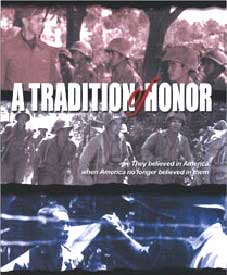When unjustly interned Japanese were required to sign documents pledging their devotion to America & their hatred of Japan, it was a mind game & an added level of psychological cruelty, forcing American citizens to choose between their mother Japan or their father America.
Some like Jimmy Murikitani (celebrated in The Cats of Mirikitani, 2006) refused to take this assinine loyalty oath & even spoke angrily of not wanting their damned citizenship anymore. The government obliged them in the wickedest of all neener-neeners & when the war was over literally used them as slave laborers. But the majority submitted to any humiliation to prove they were loyal Americans.
And many men strong in their youth agreed to serve in the all-Nissei 100th Battalion & the 442 Regiment, fighting the Nazis from Italy to France to Germany. These men are celebrated in A Tradition of Honor (2002), who proved that for Japanese Americans assaulted by injustices by their own government, it was a time of extravagant heroism.
A Tradition of Honor interviews survivors of the most decorated units of the war. These Japanese American soldiers rescued the so-called "Lost Battalion" at extravagant cost among their own lives, & participated even in the liberation of the Jews of Dachau while their own families were interned in camps surrounded by barbed wire & gun towers in American deserts.
Very broadly speaking there were two "kinds" of Japanese Americans serving. There were the ethnic Japanese of Hawaii who had not experienced internment but had aggressively petitioned the government for their right to serve after the attack on Pearl Harbor, a time when Japanese American soldiers were being mustered out & categorized as "enemy agents." They did not have the same psychological frame of mind as the sons of internment camp families.
These latter were more emotionally beaten down & didn't always get along with the Hawaiian men. The irony was that many of the Hawaiians grew up in ethnic enclaves & English was their second language, while the majority of the sons of interned families spoke perfect English frequently without accent, yet had had the greater suspicions put upon them.
I've never completely understood why Hawaiian Japanese Americans were exempted from this special abuse, except that it would've required the rounding up of over one-third of the entire population of the islands.
So the experience of Japanese American soldiers is complex & layered, not just one thing; but in many ways it is the sons of internment camp families whose experience is the most moving, because always in the back of their minds they knew they must excell at any cost to themselves, to in no way shame their interned familes. And to look in the eyes of such heroic men in their old age, still tearful from the sting of injustice in their youth, the deaths of so many friends, to hear their stories in their own words -- this is painful & moving.
The 100th & 442nd were put into the worst sustained combat of the war. Of their many beyond-the-call actions, the rescue of the Lost Battalion has gone down in history as one of the ten greatest battles for America in World War II.
To save the lives of 211 Texans, the 442nd lost 216 men, besides the 856 wounded. When Major General John Dahlquist reviewed what was left of the 442nd, he did not know the facts, & criticized the colonel: "I told you to send in the entire regiment!" The colonel replied, "Sir, this is the entire regiment. The rest are dead or hospitalized."
For their size & length of service, the "Buddhaheads" of the 442nd were the most decorated regiment of the entire war. The original 4,000 men grew to 14,000 total after 3.5 rotations. Between them they accumulated an unprecidented 9,486 Purple Hearts, 21 Medals of Honor & 8 Presidential Unit Citations.
copyright © by Paghat the Ratgirl
|
